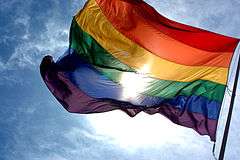Gilbert Baker (artist)
| Gilbert Baker | |
|---|---|
| Born |
June 2, 1951 Chanute, Kansas |
| Residence | New York City, New York [1] |
| Occupation | Artist |
| Known for | Designing the Rainbow Flag |
| Website | http://gilbertbaker.com |
Gilbert Baker (born June 2, 1951 in Chanute, Kansas) is an openly gay artist and civil rights activist who in 1978 designed the Rainbow Flag, sometimes also called the Pride Flag, Gay Pride Flag, LGBT Pride Flag, or, since the early 1990s, Queer Flag, that is often used as a symbol of pride in LGBT rights marches.
Biography
Baker grew up in a small town in Kansas, and his grandmother owned a woman's clothing store.[2] He served in the US Army from 1970 to 1972. He was stationed in San Francisco at the beginning of the gay rights movement. After his honorable discharge from the military, he taught himself to sew. He used his skill to create banners for gay-rights and anti-war protest marches. It was during this time that he met and became friends with Harvey Milk.
In 1979, he began work at Paramount Flag Company in San Francisco, then located on the southwest corner of Polk Street and Post Street in the Polk Gulch neighborhood. Baker has designed displays for Dianne Feinstein, the Premier of China, the presidents of France, Venezuela and the Philippines, the King of Spain, and many others. He also designed creations for numerous civic events and San Francisco Gay Pride. In 1984, he designed flags for the Democratic National Convention.
In 1994, Baker moved to New York City, where he now lives, and continued his creative work and activism. That year he created the world's largest flag (at that time) in celebration of the 25th anniversary of the Stonewall Riots[1] that took place in 1969.
In 2003, to commemorate the Rainbow Flag’s 25th anniversary, Baker created a Rainbow Flag that stretched from the Gulf of Mexico to the Atlantic Ocean in Key West. After the commemoration, he sent sections of this flag to more than 100 cities around the world.[1]
Due to his creation of the rainbow flag, Baker has used the drag queen name "Busty Ross".[2]
Flag
The colors on the Rainbow Flag reflect the diversity of the LGBT community. When Gilbert Baker raised the first rainbow flags at San Francisco Pride (his group raised two flags at the Civic Center) on June 25, 1978, it had eight colors, each with a symbolic meaning:
- Hot Pink: sexuality
- Red: life
- Orange: healing
- Yellow: sunlight
- Green: nature
- Turquoise: magic/art
- Blue: serenity/harmony
- Violet: spirit
Thirty volunteers had helped Baker hand-dye and stitch the first two flags in the top-floor attic gallery of the Gay Community Center at 330 Grove Street in San Francisco.[2][3] As they were not supposed to use dye in public washing machines, they waited until late at night to rinse out the dye from their clothes, and put Clorox in the washing machines after they left.[2]
The design has undergone several revisions to first remove then re-add colors due to widely available fabrics.[4][5] As of 2008, the most common variant consists of six stripes, with the colours red, orange, yellow, green, blue, and violet. Baker refers to this version of the flag as the "commercial version", because it came about due to practical considerations of mass production.[6] Specifically, the rainbow flag lost its hot pink stripe when Baker approached the Paramount Flag Company to begin mass producing them, and the hot pink fabric was too rare and expensive to include. The rainbow flag lost its indigo stripe before the 1979 Gay Freedom Day Parade, as the committee organizing the parade wanted to fly the flag in two halves, from the light poles along both sides of Market Street, so it became a six-striped flag with equal halves.[2]
The Rainbow Flag is commonly flown horizontally, with the red stripe on top, as it would be in a natural rainbow.
Media
In 2003, Baker and his Key West project were the subject of Rainbow Pride, a feature-length documentary by Marie Jo Ferron, bought by PBS National and debuting in New York on WNET.
Baker recreated his original Rainbow Flag for the Academy-award winning 2008 film Milk, and is shown being interviewed on one of the featurettes of the DVD release.
Baker's Rainbow Flag was acquired by the Museum of Modern Art (MoMA) in 2015 and is on display in the contemporary design galleries.[7]
References
- 1 2 3 "Gilbert Baker biography". Retrieved 29 November 2014.
- 1 2 3 4 5 Swanson, Ana. "How the rainbow became the symbol of gay pride". The Washington Post. Retrieved 2015-06-29.
- ↑ Witt, Lynn, Sherry Thomas & Eric Marcus (1995). Out in All Directions: The Almanac of Gay and Lesbian America. New York, Warner Books. ISBN 0-446-67237-8. p. 435.
- ↑ "The Rainbow Flag". Retrieved 2007-08-21.
- ↑ Gilbert Baker (18 October 2007). "Pride-Flyin' Flag: Rainbow-flag founder marks 30-years anniversary". Metro Weekly. Retrieved 2008-03-13.
- ↑ The Gay Betsy Ross on YouTube, In the Life Media, 2009. Retrieved 3 Jan 2011.
- ↑ Paola Antonelli (June 17, 2015). "MoMA Acquires the Rainbow Flag". MoMA. Retrieved May 30, 2016.
External links
- Biography on Gilbert Baker Website
